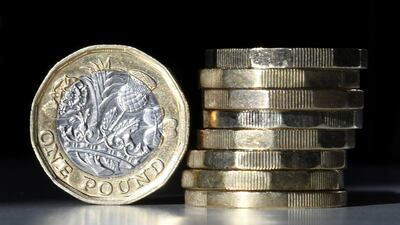US investment bank Goldman Sachs is advising clients to buy the British pound as it expects Britain and the European Union to reach a post-Brexit trade deal early next month.
The lender urged its clients to “go long” on sterling versus the euro on Monday, as it said the UK and EU are converging towards a relatively ‘thin’ trade deal by the beginning of next month, which will then be ratified by the end of the year.
“Though it is unlikely to be a straight line from here, we think the market is still pricing a significant degree of uncertainty into sterling that is no longer warranted,” Goldman Sachs said in a research note.
“An orderly exit should persuade longer-term investors to reduce their UK underweights that have persisted since the referendum, as well as significantly reduce the risk that the Bank of England will introduce negative rates."
The pound first plunged in value in 2016 when the UK voted to leave the European Union in a national referendum. In March, sterling fell to its lowest level against the US dollar since 1985, when it plunged to $1.15 amid fears the coronavirus pandemic would send investors flocking to safe haven currencies.
The pound was sitting at $1.28 against the dollar at 3pm London time on Monday, and at 92 pence against the euro and Goldman Sachs expects it to strengthen further on the back of a post-Brexit deal.
"While we have frequently cautioned that the more uncertain global backdrop has made it harder to express views on the Brexit process in the currency this year, we are encouraged by the pound’s increasingly idiosyncratic price action as the negotiation deadlines draw near," Goldman Sachs said.
The bank expects the pound to strengthen to 87 pence against the euro and said "investors with a stronger conviction that risk conditions will improve into year-end should consider expressing the view in cable (sterling/dollar) to also benefit from likely dollar depreciation".
The derivatives market indicates that traders have bought more protection against future pound volatility. The cost for one-month options – which encompass the timing of a possible Brexit deal – in sterling/dollar are around their highest level in the last six months.
Three-month option costs, however, have fallen, suggesting investors are less concerned about pound volatility at the end of the year, when the Brexit transition period will be ending.
While Goldman Sachs expects a trade-deal next month, a separate report said a no-deal Brexit compounded by the Covid-19 pandemic could see Britain's economy contract by 6 per cent and lose £134 billion ($173.06bn) annually.
While Covid-19 alone will cost the UK about £50bn a year in lost gross domestic product, a no-deal Brexit would cost the UK an additional £84bn a year in lost GDP, The Outlook for Trade after Brexit study from global law firm Baker McKenzie and economic consultancy Oxford Economics found on Monday.


